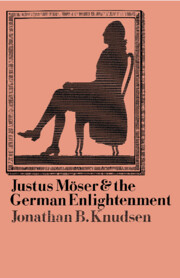Book contents
- Frontmatter
- Contents
- Preface
- Acknowledgments
- Abbreviations
- 1 Justus Möser in the German Enlightenment
- 2 Möser's social universe: urban notability and Enlightenment intelligentsia
- 3 Möser's political universe: secular politics in a confessional state
- 4 Moser's historical universe: regional history and cosmopolitan history
- 5 The party of incremental movement: social and economic reform in Möser's Osnabrück
- 6 Möser's social theory: local patriotism and the defense of the estates
- 7 The dialectic of Enlightenment: the debate over theory and practice
- Bibliography
- Index
2 - Möser's social universe: urban notability and Enlightenment intelligentsia
Published online by Cambridge University Press: 17 September 2009
- Frontmatter
- Contents
- Preface
- Acknowledgments
- Abbreviations
- 1 Justus Möser in the German Enlightenment
- 2 Möser's social universe: urban notability and Enlightenment intelligentsia
- 3 Möser's political universe: secular politics in a confessional state
- 4 Moser's historical universe: regional history and cosmopolitan history
- 5 The party of incremental movement: social and economic reform in Möser's Osnabrück
- 6 Möser's social theory: local patriotism and the defense of the estates
- 7 The dialectic of Enlightenment: the debate over theory and practice
- Bibliography
- Index
Summary
Except for two years of university study in Jena and Göttingen (1741–3), one six-month diplomatic trip to England (1763–4), and regular journeys to Hanover and the neighboring spa at Pyrmont, Justus Möser never left Osnabrück. It is not that he was forced to remain there but that, apparently, he lacked the desire to leave. On one known occasion (1753) he rejected an offer of advancement in the Hanoverian chancellery in order to remain in Osnabrück. In his polite letter to the privy councillor, Strube, Möser gave no clues to his personal motivations for staying; rather he couched his refusal in terms of local politcs. Were he to leave his Osnabrück posts, a Catholic secretary would have to be appointed as his replacement: “on this account various patrons and particularly a few from the evangelical Ritterschaft have made objections which have brought honor but also even more obligations.” Of his trip to England, we feel none of the profound regret that characterized Lichtenberg's sense of exile in Göttingen. “The English are slaves to freedom,” Möser wrote shortly after his return. “[T]hey pay too dearly for it with a large portion of their peace and their wealth. Their phantasy, however, remains unaffected in the way they portray the law of other countries so that it will best contrast with their own freedom. Looking abroad there is nothing but Hell itself….
- Type
- Chapter
- Information
- Justus Möser and the German Enlightenment , pp. 31 - 64Publisher: Cambridge University PressPrint publication year: 1986

